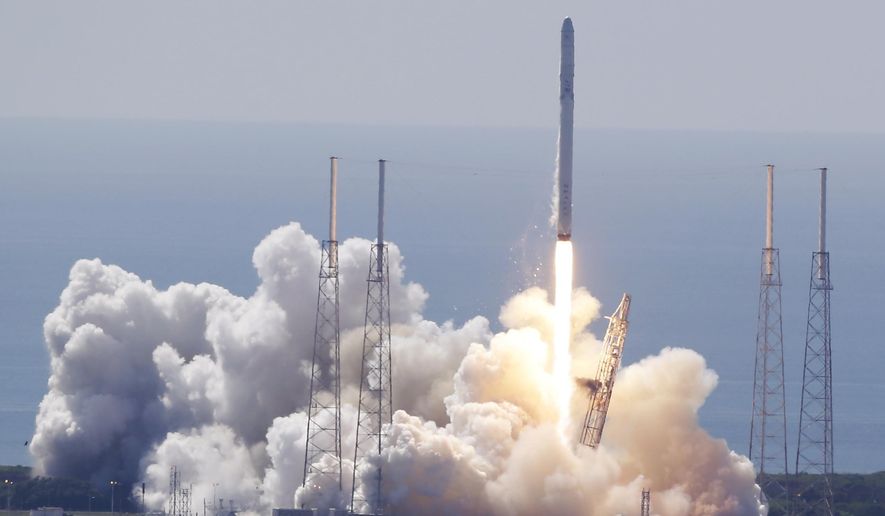The recent Sunday explosion of a SpaceX Falcon 9 rocket high above the skies of Cape Canaveral should not reignite Washington’s willingness to use Russian rocket engines, Senate Armed Services Committee John McCain said on Monday.
“This mishap in no way diminishes the urgency of ridding ourselves of the Russian RD-180 rocket engine,” Sen. McCain said in a statement. “With Russian troops still occupying Ukraine and killing its citizens, I will continue to oppose language currently in the House defense authorization bill, which guarantees that $300 million of taxpayer money will go to Vladimir Putin, his cronies, and the Russian military industrial base.”
Last year, Congress effectively banned further American use of Russian rocket engines, which have been continuously used for nearly a decade by United Launch Alliance (ULA), a joint venture between Boeing and Lockheed Martin.
The RD-180 engines, manufactured by Russian state sponsored government enterprise NPO Energomash in Moscow have been utilized in 60 missions as part of the Air Force’s Evolved Expendable Launch Vehicle (EELV) national security satellite launch program, and boasts a reported 100 percent success rate.
But Congress prohibited ULA from continuing to acquire more RD-180 engines from Moscow as part of last year’s National Defense Authorization Act. The ban was passed shortly after the Kremlin annexed the Crimea and began arming Russian separatists in Ukraine.
Since the invasion, the rocket engine has caused heated debate in political circles and raised ire between Washington and Moscow.
Sen. McCain and other Congressional leaders including Democrats such as former astronaut Sen. Bill Nelson have led the charge against American reliance on Russian space technology, and heralded a call for Washington to return NASA and the Pentagon to a position of space dominance.
But the Russians have continuously insisted that differences between the two countries should not interfere with international space relations. Russian Deputy Prime Minister Dmitry Rogozin responded to Sen. McCain’s Monday state that same day, calling upon the U.S. to recall the rocket engine ban.
“In space, there is no room for politicking,” Mr. Rogozin tweeted.
Because of the Air Force’s reliance upon the RD-180 engine, the Pentagon has pushed Congress to ease the ban on Moscow. Last month, Defense Secretary Ash Carter and Director of National Intelligence James Clapper wrote a letter to senior Congressional lawmakers McCain expressing concern over whether the ban would permit the military to fulfill its current EELV objectives to launch national security satellites into space.
Since then, both the House and Senate have passed separate bills easing the Russian rocket restrictions, and currently, a House-Senate negotiating committee is trying to work out the differences between the two bills.
On Monday, the Pentagon hinted that the SpaceX explosion was reason enough not to rely on one source for rocket launch capability.
“We think that this really… demonstrates the need for assured access to space through two routes,” said Army Col. Steve Warren.
SpaceX has emerged as the great hope to return the U.S. to space independence from Moscow since its rockets and engines are 100 percent wholly American made. The company’s corporate headquarters are located in Hawthorne, California and it has launch sites at Cape Canaveral Air Force Station and Vandenberg Air Force Base.
Sen. McCain defended SpaceX on Monday saying, “I am confident that this minor setback will in no way impede the future success of SpaceX and its ability to support U.S. national security space missions.” The Republican chairman added that if the “competitive environment were placed at risk in coming years,” Washington could reconsider the ban “in order to mitigate any national security impacts.”
Sunday’s launch was sending more than 5,200 pounds of cargo to the International Space Station, but shattered 27 miles above the surface at a speed of 2,900 miles per hour. SpaceX founder and CEO Elon Musk said the pressure got too high in the liquid oxygen tank of the rocket’s upper stage.
“That’s all we can say with confidence right now,” Mr. Musk tweeted online from the SpaceX Twitter page.
Sunday’s event marked the third rocket explosion in the past year. In April, a Russian cargo ship burned up upon re-entry, and previously in October an Orbital Sciences Corp. capsule was destroyed in a launch accident in Virginia. Both SpaceX and Orbital Sciences have contracts to ship NASA cargo.
Some experts made note of the explosions.
“Three failures on three different vehicles is unusual, but it would be even more worrisome if we had only one means of access,” former NASA associate administrator Scott Pace told The Associated Press.
• Jeffrey Scott Shapiro can be reached at jshapiro@washingtontimes.com.




Please read our comment policy before commenting.